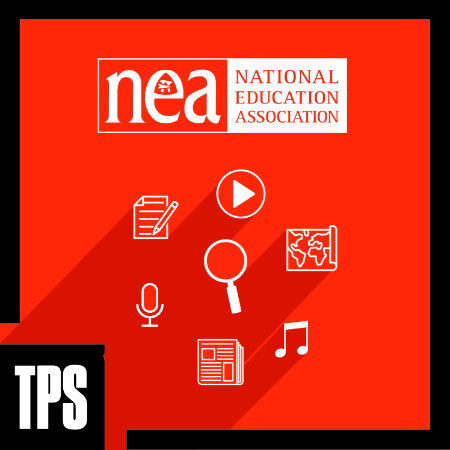On Your Time Learning: NEA TPS Micro-credentials
Citizen U has developed a series of 8 micro-credentials (MCs) in a partnership with the National Education Association (NEA) and thanks to the Library of Congress Teaching with Primary Sources TPS program grant. This professional learning offering aims to help educators better integrate inquiry learning with primary sources into instruction across grades and disciplines using a variety of frameworks and strategies. It was developed in collaboration with NEA educators and TPS Consortium partners Emerging America, Collaborative for Educational Services; Inquiry in the Upper Midwest, Minnesota Historical Society; Right Question Institute; and the TPS Western Region.
These TPS MCs are asynchronous, meaning educators can complete them on their own time at any time. While implementing educator-created activities and lessons in the classroom is ideal, if that is not possible participants may submit peer reviews in lieu of samples of student work.
In addition to assembling digital portfolios and earning digital badges, educators typically can also receive local/state certification of professional development credit towards license renewal and/or salary advancement. NEA members in a number of states may also apply for graduate credit for a supplemental fee as indicated in the state guidelines below.
TPS MCs are free for NEA members in every state and Citizen U has a number vouchers valued at $75 each for non-members (apply with a valid school email). Funding may also be available for school districts interested in enrolling a large group of educators consisting of some or all non-NEA members; contact us to learn more.
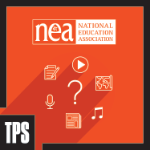 Inquiry with Primary Sources*
Inquiry with Primary Sources*
Competency: Educator uses inquiry to engage learners in analysis of primary sources to promote student empathy, foster understanding of multiple perspectives, deepen content knowledge, and enhance critical thinking skills.
Key Method: Educator curates relevant and appropriate primary source sets to develop and analyze an inquiry-based primary source learning activity.
View PDF | Access the Micro-credential
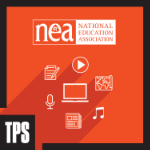 Connecting Primary Sources & Technology for Formative Assessment
Connecting Primary Sources & Technology for Formative Assessment
Competency: Educator connects primary sources with technology for formative assessment to meet instructional goals and increase student engagement with course content.
Key Method: Educator creates or revises a lesson that uses technology for formative assessments of primary sources.
View PDF | Access the Micro-credential
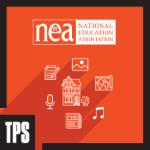 Connecting Primary Sources with Historic Places
Connecting Primary Sources with Historic Places
Competency: Educator connects primary sources with an historic place to meet instructional goals and increase student engagement with course content.
Key Method: Educator creates or revises a lesson that connects primary sources with a historic place to teach about an event, person, or landscape.
View PDF | Access the Micro-credential
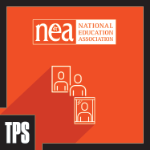 Culturally Relevant Pedagogy with Primary Sources
Culturally Relevant Pedagogy with Primary Sources
Competency: Educator uses primary sources and inquiry strategies to craft culturally relevant instruction.
Key Method: Educator develops and analyzes a lesson that incorporates the three tenets of culturally relevant pedagogy with primary sources
View PDF | Access the Micro-credential
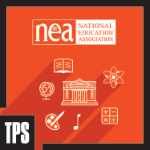 Multidisciplinary Civics with Primary Sources
Multidisciplinary Civics with Primary Sources
Competency: Educator uses inquiry learning with primary sources to enhance students’ civics knowledge, skills, and dispositions across one or more disciplines.
Key Method: Educator develops and analyzes a multidisciplinary civics lesson using inquiry and primary sources.
View PDF | Access the Micro-credential
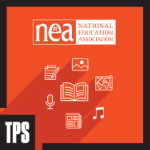 Pairing Primary Sources with Historical Picture Books
Pairing Primary Sources with Historical Picture Books
Competency: Educator uses an inquiry approach to learning that utilizes primary sources and an historical picture book.
Key Method: Educator develops and analyzes an inquiry-based lesson that pairs an historical picture book with a curated set of related primary sources.
View PDF | Access the Micro-credential
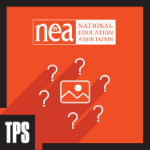 The Question Formulation Technique & Primary Sources
The Question Formulation Technique & Primary Sources
Competency: Educator uses the Question Formulation Technique (QFT) to engage learners in content by generating and analyzing questions about a primary source.
Key Method: Educator creates or revises a lesson using the QFT with a primary source, directly connecting students’ questions to the next steps of their learning.
View PDF | Access the Micro-credential
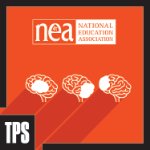 Universal Design for Learning with Primary Sources
Universal Design for Learning with Primary Sources
Competency: Educator uses UDL with primary sources to provide multiple means of engagement, representation of information, and opportunities for action and expression to increase universal accessibility of course content and skills.
Key Method: Educator customizes and augments a primary source learning activity by employing UDL principles to increase universal accessibility.
View PDF | Access the Micro-credential
* Educators with no foundational training in teaching inquiry with primary sources from the Library of Congress may find it helpful to begin with the Inquiry with Primary Sources micro-credential before proceeding to subsequent ones.
State Guidelines for License Renewal and/or Salary Advancement for Successfully Completed TPS Micro-credentials
Guidelines vary by state. Educators who need approval prior to beginning this professional development offering should submit the corresponding PDF file to their school or district administrator. Questions or have information on your state’s guidelines? Contact us.
- Alabama: Yes, NEA members should contact the Alabama Education Association to receive credit; non-members should check with their school or district administrator
- Alaska: Not at this time
- Arizona: Under review
- Arkansas: Seeking information
- California: Seeking information
- Colorado: Likely, submit the corresponding PDF file to your school or district administrator for prior approval
- Connecticut: Seeking information
- Delaware: Yes, 30 hours (i.e., 2 MCs) will be granted credit every 5 years
- Florida: Yes, although district dependent; automatic credit in some districts while others require prior approval; contact your district administrator
- Georgia: Seeking information
- Hawaii: Not at this time
- Idaho: Seeking information
- Illinois: Yes, NEA members should contact the Illinois Education Association to receive credit; non-members can receive CPDUs through DePaul University for a $10 processing fee (contact us)
- Indiana: Yes, submit the corresponding PDF file to your school or district administrator for prior approval
- Iowa: Yes, one license renewal credit per microcredential is available to all Iowa educators through ISEA (email copy of NEA TPS badge)
- Kansas: Likely, submit the corresponding PDF file to your school or district administrator for prior approval; Kansas NEA members may apply for grad credit (1 credit per micro-credential) from Baker University (scroll to Continuing Education Partnerships section)
- Kentucky: Likely, submit the corresponding PDF file to your school or district administrator for prior approval; automatic acceptance for educators going through remediation
- Louisiana: Seeking information
- Maine: Seeking information
- Maryland: Statewide policy under review; in the meantime, submit the corresponding PDF file to your school or district administrator for prior approval
- Massachusetts: Under review
- Michigan: Seeking information
- Minnesota: Seeking information
- Mississippi: Seeking information
- Missouri: Likely, submit the corresponding PDF file to your school or district administrator for prior approval; Missouri NEA members may apply for grad credit (1 credit per micro-credential) from Baker University (scroll to Continuing Education Partnerships section)
- Montana: Yes, although district dependant; check with your school or district administrator
- Nebraska: School districts generally provide professional development but educators may submit the the corresponding PDF file to the district for prior approval
- Nevada: Yes, verify the correct process with the appropriate professional development coordinator
- New Hampshire: Yes, as long as each MC aligns with your professional development goals; for district teachers, submit the corresponding PDF file to your local district review committee; for teachers who are not employed by a district, the state reviews the learning
- New Jersey: Yes, educators simply need a certificate of participation from the provider that includes the session provider, title, description, date, and number of hours completed (15 hours for each MC)
- New Mexico: Seeking information
- New York: Yes, submit the corresponding PDF file to your school administrator for prior approval who will then report the hours to the state Department of Education
- North Carolina: Under review
- North Dakota: Seeking information
- Ohio: Seeking information
- Oklahoma: Professional development not required for license renewal
- Oregon: Oregon NEA (OEA) members should send evidence of micro-credential credit to receive 15 PDUs OR they may obtain 1 semester graduate credit for $50 from Augustana University (registration form); non-members whose licenses are up for renewal through 12/31/23 do not need to provide proof of professional development (click here for details)
- Pennsylvania: Yes, NEA members are eligible for 20 Act 48 hours from the Pennsylvania State Education Association or 1 college credit (equivalent to 30 Act 48 Hours) from Edinboro University/Pennsylvania Western University for $70 (information); non-members should check with their school or district administrator
- Rhode Island: Seeking information
- South Carolina: Seeking information
- South Dakota: South Dakota NEA (SDEA) members may obtain 1 semester graduate credit/successfully completed micro-credential for $35 from Augustana University (information/registration)
- Tennessee: Seeking information
- Texas: Yes, NEA members should contact the Texas State Education Association to receive credit; non-members should check with their school or district administrator
- Utah: Seeking information
- Vermont: Seeking information
- Virginia: Yes, learn how with VEA VirtualEd
- Washington: Seeking information
- West Virginia: Seeking information
- Wisconsin: Professional development not required for license renewal
- Wyoming: Seeking information
